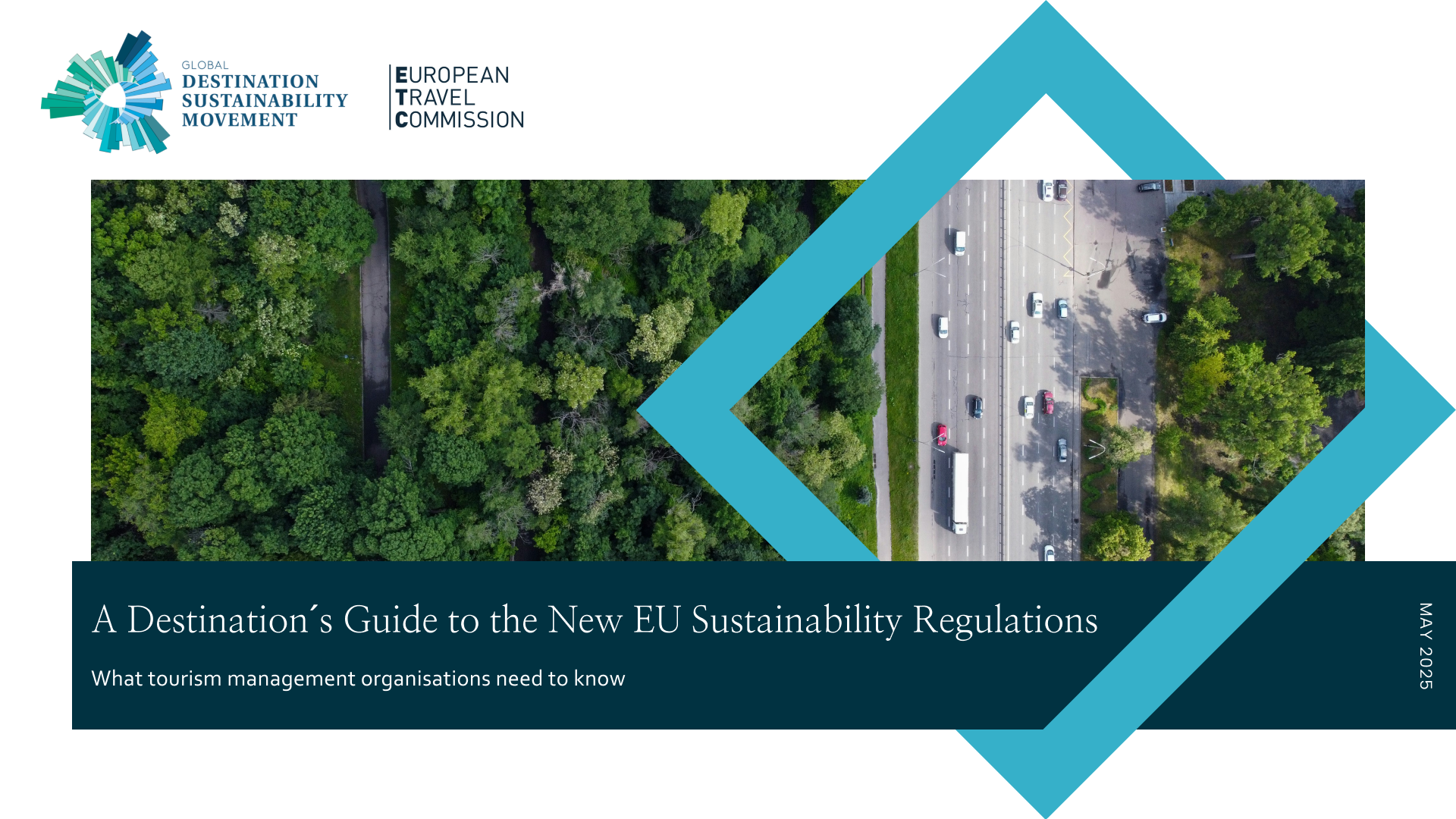You may have heard that destinations in and doing business with the EU will be subject to a set of evolving EU sustainability regulations. These regulations require greater transparency, accuracy, and in some cases, reporting.
In recent months, the GDS-Movement has been busily preparing to support its cities to get ahead of the EU sustainability curve, including a white paper and a webinar to get destinations up to speed.
The Directives are evolving in real-time. What does this mean for concerned cities trying to get to grips with the new laws and get ahead of potential litigation? How will a pause or a pull-back impact a destination? Our policy expert and the EU regulations project lead, Antonia Alomar, investigates.
CSRD Update, 14 November 2025
“BRUSSELS — Lawmakers in the European Parliament on Thursday agreed to exempt more companies from green reporting rules after the center-right, right-wing and far-right groups allied to pass the EU’s first omnibus simplification package.” – Politico
This ratifies the proposals to cut back on mandatory sustainability reporting requirements, says GDS-Movement’s Public Policy Expert, Antonia Alomar, and marks “a sad moment for … European values” according to Greens lead negotiator on the file, Kira Marie Peter-Hanse, but it also offers the opportunity to progressive-minded DMOs and CVBs to lead the charge, and deepen their sustainability contributions, regardless.
Green Claims Directive Update, 14 October 2025
In addition to the information below,
- The Corporate Sustainability Reporting Directive (CSRD) is set to apply to all businesses with 1,000 employees or more, with annual revenues of at least €450m. The revenue requirement is a new addition.
- Climate transition plans: The CSRD had initially compelled companies to develop, publish, and act upon them. Now, they will be required to develop and publish them.
- The scope of the Corporate Sustainability Due Diligence Directive (CSDDD) has also been dramatically reduced. It is set to apply only to companies with at least 5,000 employees and €1.5bn in revenues.
Find out more about this update here.
Green Claims Directive Update, 27 June 2025: Sustainability Claims’ Regulation in Question
On Friday 20th June, a surprise statement by a European Commission spokesperson announced that the Commission planned to withdraw the Green Claims Directive, a regulation aimed at banning unverified environmental claims made by companies. For context, the European Commission says that 40% of such claims have no supporting evidence. This announcement followed a letter from conservative parties in the European Parliament, arguing that the Green Claims Directive is “overly complex, administratively burdensome, and costly”.
No official statement or explanation from the Commission followed, and by Monday morning, confusion reigned. The Polish presidency cancelled what would have been the final meeting in the negotiations round, angering those European Parliament members leading the legislation. During a press conference, a visibly frustrated Sandro Gozi, the principal negotiator, declared that the Commission had “overstepped its mandate and hampered the negotiations”.
If it passes, the Green Claims Directive will introduce criteria to prohibit companies from making misleading claims about environmental merits of their products and services. Terms like “ecological”, “carbon friendly”, or “biobased” will now have to be checked by an independent and accredited verifier.
It is worth noting that the EU Green Deal, the set of policy initiatives that will lead Europe to a green transition, is still in place. Member states are acting against greenwashing and are also favouring independent, third-party verified certification systems. Last year, the Dutch courts asked KLM to withdraw its Fly Responsibly Campaign as they found it to be illegal and misguiding under EU Consumer Law. Also, the OTA giant, Booking.com, stopped its “Travel Sustainable programme” in favour of third-party certifications.
What does this mean for destinations?
The Commission has stated that it cannot give any indication of next steps or the future of this Directive. The power now lies with the co-legislators, comprised of the Council and Parliament. On Tuesday, 24 June, the Commission confirmed that it “is not withdrawing the proposal per se, but negotiations are at a standstill.” In essence, the process is paused until further notice. The Polish presidency, which oversees the negotiation meetings, has halted the negotiation process, and the Danish presidency, which takes over the Council in July 2025, is unlikely to be very engaged, as influential Sweden and Germany are strongly opposed to the proposal.
If the case were to progress, leaked details suggest that it would be a significantly reduced version of the original proposal. Notably, microenterprises, which employ approximately 76 million people in the EU or 49% of all enterprise employees in the region, would be excluded from the scope of the legislation. It remains to be seen what will happen with its penalties and bans but they are likely to be eased.
What next?
The situation remains unclear, and a delay is likely. If the legislation does pass, it will probably not reflect the initial vision of the proposal.
Guy Bigwood, CEO of GDS-Movement, encourages destinations to step up.
“The European Green Deal is not merely a roadmap,” he points out, “it is a bold mandate for positive transformation. As the Directives are debated and developed, destinations are challenged. As Directives evolve, destinations are navigating a complex landscape, but this is not a time to pause. By continuing to lead with clarity, courage, and commitment, destinations can align with regenerative principles, communicate transparently, and demonstrate measurable progress. These aren’t trends, they’re the pillars of a more resilient, future-fit visitor economy that restores ecosystems, creates local value, and rebuilds trust.”
Our partner in the EU regulations guide, ETC (European Travel Commission), weighs in with its own perspective. Its COO/Head of Public Affairs, Teodora Marinska, notes that “Destination Management Organisations have long been pioneers in promoting sustainable tourism, showing a strong commitment even beyond regulatory requirements. If the Green Claims Directive or a similar policy is revived in a new form, ETC and its members are ready to work with policymakers to craft legislation that is both ambitious and feasible. Our common goal is to develop a more sustainable and resilient tourism industry across Europe: trustworthy, transparent, and delivering genuine positive outcomes.”
Get the overview: GDS-Movement and ETC Destination´s Guide to the New EU Sustainability Regulations
In May 2025, the GDS-Movement, in collaboration with the European Travel Commission, published a guide for tourism management organisations to better steer the complexity of EU regulations.
The guide highlights a clear demand for greater clarity in this complex regulatory landscape, as well as a broader call for streamlined and effective legislation. If the Green Claims Directive pause leads to renewed negotiations and fresh momentum, there is little cause for concern. However, if it signals an intent to stall or derail the process, that is indeed troubling. We can’t forget that currently there are around 230 sustainability labels and 100 green energy labels in the EU, with nearly half offering weak or non-existent verification.
Would you like more information?
Contact Antonia Alomar, EU policy lead, at antonia.alomar@gds.earth




